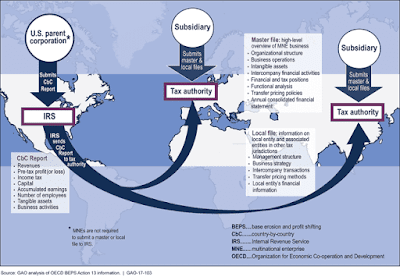The IRS issued Notice 2017-10, designating specific syndicated conservation easement transactions as listed transactions, requiring disclosure statements by both investors and material advisors.
This campaign is intended to encourage taxpayer compliance and ensure consistent treatment of similarly situated taxpayers by ensuring the easement contributions meet the legal requirements for a deduction, and the fair market values are accurate.
The initial treatment stream is issue-based examinations. Other treatment streams will be considered as the campaign progresses.
3. Foreign Base Company Sales Income: Manufacturing Branch Rules
In general, foreign base company sales income (FBCSI) does not include income of a controlled foreign corporation (CFC) derived in connection with the sale of personal property manufactured by such corporation. However, if a CFC manufactures property through a branch outside its country of incorporation, the manufacturing branch may be treated as a separate, wholly owned subsidiary of the CFC for purposes of computing the CFC’s FBCSI, which may result in a subpart F inclusion to the U.S. shareholder(s) of the CFC.
The goal of this campaign is to identify and select for examination returns of U.S. shareholders of CFCs that may have underreported subpart F income based on certain interpretations of the manufacturing branch rules. The treatment stream for the campaign will be issue-based examinations.
4. 1120F Interest Expense/Home Office Expense
This campaign addresses compliance on two of the largest deductions claimed on Form1120-F U.S. Income Tax Return of a Foreign Corporation. Treasury Regulation Section 1.882-5 provides a formula to determine the interest expense of a foreign corporation that is allocable to their effectively connected income. The amount of interest expense deductions determined under Treasury Regulation Section 1.882-5 can be substantial. Treasury Regulation Section 1.861-8 governs the amount of Home Office expense deductions allocated to effectively connected income. Home Office Expense allocations have been observed to be material amounts compared to the total deductions taken by a foreign corporation.
The campaign compliance strategy includes the identification of aggressive positions in these areas, such as the use of apportionment factors that may not attribute the proper amount of expenses to the calculation of effectively connected income. The goal of this campaign is to increase taxpayer compliance with the interest expense rules of Treasury Regulation Section 1.882-5 and the Home Office expense allocation rules of Treasury Regulation Section 1.861-8. The treatment stream for this campaign is issue-based examinations.
5. Individuals Employed by Foreign Governments & International Organizations
In some cases, individuals working at foreign embassies, foreign consular offices, and various international organizations may not be reporting compensation or may be reporting it incorrectly. Foreign embassies, foreign consular offices and international organizations operating in the U.S. are not required to withhold federal income and social security taxes from their employees’ compensation nor are they required to file information reports with the Internal Revenue Service.
This lack of withholding and reporting results in unreported income, erroneous deductions and credits, and failure to pay income and Social Security taxes. Because this is a fluid population, there may be a lack of knowledge regarding tax obligations. This campaign will focus on outreach and education by partnering with the Department of State’s Office of Foreign Missions to inform employees of foreign embassies, consular offices and international organizations. The IRS will also address noncompliance in this area by issuing soft letters and conducting examinations.
Being Audited by the IRS ?
Contact the Tax Lawyers at
Marini & Associates, P.A.
for a FREE Tax Consultation Contact us at:
or Toll Free at 888-8TaxAid (888 882-9243).
 Krull admitted that the conspiracy began in December 2014 with a currency exchange scheme that was designed to embezzle around $600 million from PDVSA, obtained through bribery and fraud, and the conspirators’ efforts to launder a portion of the proceeds of that scheme.
Krull admitted that the conspiracy began in December 2014 with a currency exchange scheme that was designed to embezzle around $600 million from PDVSA, obtained through bribery and fraud, and the conspirators’ efforts to launder a portion of the proceeds of that scheme. 









